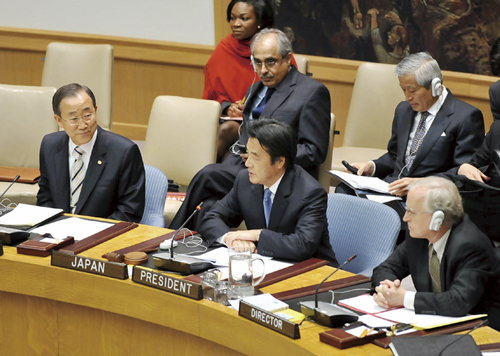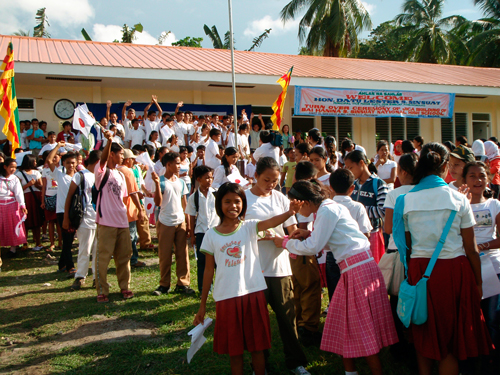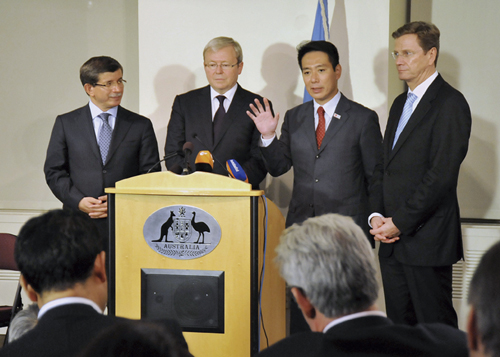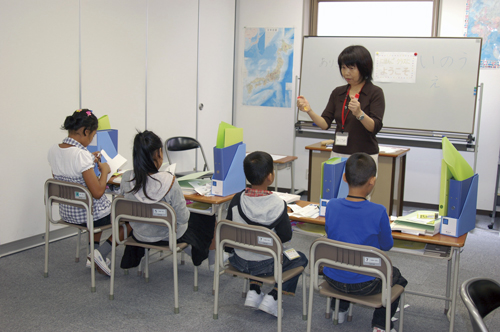
Foreign Minister Katsuya Okada, center, attending and delivering a speech at Open Debate of the UN Security Council on Post-Conflict Peacebuilding (April 16, New York, USA)
CHAPTER 3Japan�s Foreign Policy in Major Global Issues |
1. |
Efforts for the Peace and Stability of Japan and the International Community |
The security environment surrounding Japan is becoming increasingly severe as the situation on the Korean Peninsula remain unstable with the sinking of the Republic of Korea (ROK)’s naval vessel (“Cheonan”) as well as artillery attack on the ROK’s Yeonpyeong Islands. Besides, insufficient transparency over China’s military buildup, and its intensified maritime activities are of concern for the regional and global community. Moreover, the international community today faces new types of threats and challenges which include the proliferation of weapons of mass destruction and missiles, international terrorism, piracy, large-scale disasters, and cyber attacks. In order for Japan to respond to such security threats and challenges, to maintain its territorial integrity, to protect the lives and properties of Japanese citizens, and to ensure sustainable prosperity and development as well as the stability of the international community, Japan must pursue a multifaceted security policy to address not only traditional threats of aggression by other countries but also non-traditional threats such as the attacks by non-state actors.
In particular, for the purpose of maintaining stability and prosperity of the Asia-Pacific region as well as that of the international community, it is important to further deepen and develop the Japan-U.S. security alliance, which is a public good for the international community and the main cornerstone of Japan’s diplomacy and security, in a form that is suitable for the 21st century. At the same time, it is also important for Japan to cooperate with the ROK and Australia, to advance collaboration under the Japan-U.S.-ROK and Japan-U.S.-Australia frameworks, to reinforce ties with partner countries that share common interests in ensuring maritime security and other interests, to build up stable relations with China and Russia, and to promote multilayered forms of cooperation and collaboration at the ASEAN Regional Forum (ARF) and other regional frameworks. The prerequisite for these efforts will be Japan’s development of its defense capabilities. The Government of Japan set out new National Defense Program Guidelines and a new Mid-term Defense Program in December 2010, stipulating a new direction for Japan’s future security and defense capabilities.
Since the end of the Second World War, the Japan-U.S. Security Arrangement has functioned effectively not only for the defense of Japan but also as a basic framework supporting the stability and development of the Asia-Pacific region including Japan, and it has become a public good for peace and prosperity in the world. As the security environment of the Asia-Pacific region is becoming increasingly severe, it is important to further deepen the security arrangement between Japan and our ally, the United States, in order to ensure the peace and security of Japan and the region. Based on this understanding, Japan and the U.S. are strengthening cooperation not only bilaterally, but also in addressing issues concerning the Asia-Pacific region and global issues, and advancing consultations on security cooperation with the U.S. in a wide range of areas in a concrete manner.
In conflict regions, Japan is addressing peacebuilding as one of its major diplomatic issues, which is the seamless efforts ranging from the promotion of peace processes and emergency humanitarian assistance in the immediate aftermath of conflicts to security maintenance, reconstruction and long term development, while also paying attention to build the foundation for development to prevent conflict recurrence and achieving sustainable peace. In April, during Japan’s presidency, Foreign Minister Katsuya Okada chaired a ministerial debate of the UN Security Council on post-conflict peacebuilding during. Peacebuilding was also addressed at the UN Security Council summit in September attended by Prime Minister Naoto Kan, and the importance of this field is becoming recognized by the international community. Japan has been advancing tangible efforts to peacebuilding through contributions including United Nations Peacekeeping Operations (PKO), on-site efforts with Official Development Assistance (ODA), work through the UN and human resources development.

Foreign Minister Katsuya Okada, center, attending and delivering a speech at Open Debate of the UN Security Council on Post-Conflict Peacebuilding (April 16, New York, USA) |

A handling-over ceremony of an elementary school building established by Japanese assistance (Philippines) |
Securing maritime security and safety of maritime navigation is not only crucial for Japan’s existence and prosperity as a maritime and trading country, but also extremely important to the regional economic development. In particular, the number of piracy incidents increased in 2010 the Somali Basin, off the eastern coast of Somalia, off the western coast of India, and offshore Tanzania, some and incidents in which Japan-related vessels being attacked or captured have occurred. Japan is exerting efforts by taking a multi-faced approach, which includes the deployment of Japan Self Defense Forces (JSDF), off the coast of Somalia and in the Gulf of Aden, but also long and mid-term efforts such as assistance for capacity building of coastal countries’ capabilities for preventing and suppressing piracy and for regional cooperation, and furthermore, assistance toward the stabilization of the situation in Somalia.
Illicit drug trafficking, trafficking in persons, money laundering, cybercrimes, other transnational crimes, terrorism, and corruption (bribery) are threatening the public security of the entire world, along with the advances in information and communications technologies and international transportation networks that are the hallmarks of modern society. Efforts to address these issues are being made at the United Nations (UN), the G8, and various other forums. In 2010, these topics were addressed as “security vulnerabilities” at the G8, and attracted the attention of the international community. Japan is responding to these threats using various means including the UN, G8, G20, and other multilateral frameworks, bilateral consultations and cooperation on terrorism countermeasures, and through aid to developing countries such as those via the United Nations Office on Drugs and Crime (UNODC) and other international organs.
Japan is also actively advancing efforts for disarmament and non-proliferation to improve the security environment surrounding the country. Based on its moral responsibility as the only country in the world to have suffered the devastation caused by the use of atomic bombs, Japan is making efforts with like-minded countries toward realizing “a world without nuclear weapons.” At the May 2010 Review Conference of the Parties to the Treaty on the Non-Proliferation of Nuclear Weapons (NPT), Japan made important contributions toward the first adoption of final documents in ten years through such efforts as submitting the working papers which provided the basis for the discussion and taking an initiative in the delivery of the “Ministers’ Urgent Call for Unity” released in the final stages of the conference. Moreover, Japan and Australia co-hosted the 1st Foreign Ministers’ Meeting on Nuclear Disarmament and Non-Proliferation in September with the aim of contributing to steady implementation of the consensus outcomes of the 2010 NPT Review Conference, launching a new group of like-minded countries from diverse regions across the globe and took a leading role toward strengthening the international disarmament and non-proliferation regime.

Foreign Minister Seiji Maehara, second from right, at the Foreign Ministers' Meeting on Nuclear Disarmament and Non-Proliferation co-hosted by Japan and Australia (September 22, New York, USA) |
The role of the United Nations has become increasingly important, as the international community is still facing a series of challenges that include poverty, hunger, infectious diseases, proliferation of weapons of mass destruction and missiles, regional conflicts, and global environmental problems. As the sole international organization with universal membership and comprehensive capacities, the UN continues to work for the maintenance of peace and security of the international community through such organs as the General Assembly and the Security Council. In addition, it enhances friendly relations among countries, and encourages international cooperation to resolve economic, social, cultural and humanitarian issues and to promote human rights.
It is important that the UN function effectively for the international community to unite toward resolving the above-mentioned challenges. From this perspective, Japan is striving for an early realization of UN reform, especially the Security Council reform, and is playing a leading role in major international organizations including the UN, while making human resources and financial contributions.
The establishment of the “rule of law” in the international community is an important factor in promoting stable of relations between countries, peaceful settlement of disputes, and “good governance” within countries. Japan regards the establishment of the “rule of law” in the international community as one of the pillars of its foreign policy, and it is actively implementing various efforts towards this end. Establishing the "rule of law" is also important from the perspectives of maintaining the integrity of the national territories, securing maritime and economic interests, and for protecting one's own citizens.
Fully guaranteeing human rights and fundamental freedoms, which are universal values, in each country contributes to the establishment of a peaceful and prosperous society in each country, and therefore to the peace and stability of the international community. In a move of mainstreaming human rights, the UN emphasized the viewpoints of human rights on all of its activities since 2005, and in 2006 established the Human Rights Council as a subsidiary organ of the United Nations General Assembly, with replaced the Human Rights Commission Japan has served as a member of the Human Rights Council since it was founded and has positively contributed to its activities. While giving consideration to the characteristics and diverse historical and cultural backgrounds of each country and region, Japan will strengthen its foreign policy in order to promote human rights in a comprehensive manner, by linking efforts in multilateral for a such as the UN ad bilateral efforts including human rights dialogues and development assistance.

A class of Myanmar refugee students staying in Japan under a resettlement operation (Tokyo, Japan) |
To handle the global issues explained above, Japan stresses the concept of human security by focusing on the lives and livelihoods of every human being, and under this concept, will act to lead the international community to resolve such issues.